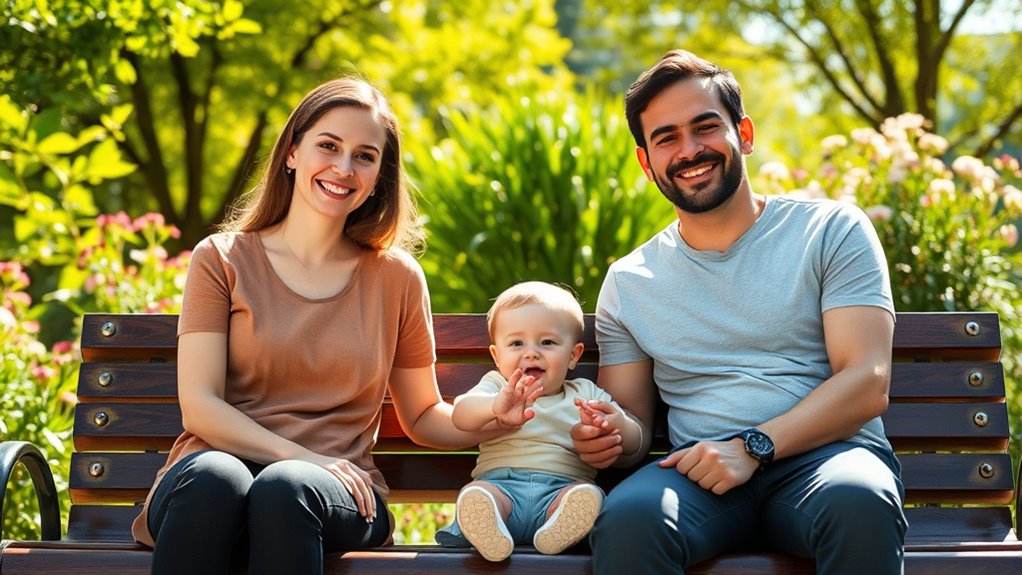To co-parent effectively after divorce, focus on building a supportive and cooperative relationship that prioritizes your child’s needs. Maintain open communication, minimize conflicts, and aim for consistent parenting practices. Embrace shared custody to provide stability and emotional security, especially when sharing time equally. Recognize the importance of forgiveness and social support to reduce tension. If you want to learn more about fostering a healthy co-parenting environment, you’ll find helpful strategies ahead.
Key Takeaways
- Maintain open, respectful communication to foster cooperation and support shared parenting goals.
- Prioritize the child’s emotional security by creating a stable, loving, and conflict-minimized environment.
- Aim for balanced custody arrangements, such as 50/50 sharing, to promote healthy development and involvement.
- Address and manage conflicts proactively, using forgiveness and understanding to reduce tension.
- Focus on building a supportive coparenting relationship, emphasizing collaboration over disagreement.

Co-parenting after divorce is a critical factor that influences your child’s well-being and adjustment. As a parent steering this new reality, you need to prioritize creating a supportive environment where your child feels loved, secure, and valued by both parents. Over recent decades, shared physical custody has become more common, more than doubling from 13% before 1985 to around 34% by 2010-2014. This shift reflects changing social norms and policies that promote joint parenting roles, especially among non-Hispanic White and socioeconomically advantaged families. These trends suggest that more parents recognize the benefits of sharing custody, which can lead to better living arrangements and more consistent parenting practices for your child.
Supporting effective coparenting starts with maintaining a positive relationship with your ex-partner, especially before the divorce. Parents who had stronger, more committed relationships tend to develop higher initial levels of supportive coparenting, and even if it’s lower at first, it can improve over time. Conversely, if one parent begins a new romantic relationship soon after separation, it can lower the perceived supportiveness in coparenting. Children’s temperament also affects this dynamic; difficult or challenging behaviors can initially reduce supportive cooperation between parents. Nonetheless, understand that supportive coparenting generally declines over time, making it essential to work actively to sustain cooperation and avoid letting conflicts escalate. Additionally, understanding the importance of home furnishings and creating a comfortable environment can help facilitate smoother transitions and stability for your child during this period.
Strong pre-divorce relationships foster better coparenting, which can improve over time with effort and cooperation.
High-conflict divorces pose significant challenges, often leading to increased disagreements and social disapproval from your social network. Social disapproval can heighten tensions, but forgiveness between you and your ex-partner acts as a crucial mediator, reducing conflict and fostering a more cooperative environment. While both parents tend to agree on the existence of disagreements, perceptions of social disapproval may differ, and these perceptions can influence how you interact. Gender differences might also shape how conflicts are reported, but forgiveness remains a key factor in steering these conflicts and maintaining a healthier coparenting relationship.
Striving for a balanced 50/50 timesharing schedule can profoundly benefit your child’s emotional security. Children who spend equal time with both parents tend to experience less anxiety about abandonment and are generally more emotionally resilient. This arrangement also encourages greater father involvement, which supports your child’s social and emotional development. Although conflict remains a risk factor, balanced timesharing can buffer the negative impacts of parental disagreements. Research shows that the closer your parenting schedule aligns to an equal split, the better your child’s outcomes will be. Research from 2023 confirms that children in shared parenting arrangements do equally well as those in traditional nuclear families, indicating that equitable sharing of parenting time fosters positive development. Ultimately, your goal should be to foster a cooperative, conflict-minimized environment where your child’s needs come first, helping them thrive despite the changes that divorce brings.
Frequently Asked Questions
How Can I Rebuild Trust With My Ex-Partner?
To rebuild trust with your ex-partner, start by addressing any trust violations directly and set clear boundaries. Focus on small, consistent actions that demonstrate reliability, like keeping promises and communicating respectfully. Prioritize your child’s well-being and avoid involving them in conflicts. Be patient and accept that trust takes time to restore. Keep open, honest communication and stay committed to working together for your child’s best interests.
What Are the Best Ways to Handle Disagreements Publicly?
When handling disagreements publicly, you should stay calm and use neutral language to avoid escalating the situation. Focus on child-related topics and keep discussions brief and factual. Use signals or phrases to pause disagreements and revisit privately. Limit emotional expressions, and if needed, involve a mediator. This helps reduce children’s stress, model respectful behavior, and keep conflicts from impacting your child’s well-being.
How Do I Ensure Consistency in Parenting Styles?
You guarantee consistency in parenting styles by establishing clear, shared rules and routines from the start. Communicate openly with your co-parent and use tools like shared calendars to stay aligned on schedules and expectations. Create a written co-parenting plan and stick to it, enforcing rules equally in both households. Regular check-ins and flexible negotiation help maintain unity, making your child’s environment stable and predictable.
What Should I Do if My Ex Violates Custody Agreements?
If your ex violates custody agreements, you should document every incident with dates, times, and communications. Talk to them if it’s safe, aiming to resolve the issue informally. If not, consult a family law attorney for legal advice. Avoid retaliating by withholding visitation. You can file a motion for contempt or seek emergency court orders if your child’s safety is at risk. Keep detailed records to support your case.
How Can I Support My Child’s Emotional Needs During Transitions?
A problem shared is a problem halved, and you can support your child’s emotional needs during shifts by creating a safe space for them to express feelings openly. Keep communication consistent and reassuring, and stay involved in their life. Recognize signs of distress early, like withdrawal or academic struggles, and seek professional help if needed. Your steady presence and cooperation help your child feel secure and loved through tough times.
Conclusion
So, you’ve turned the chaos of divorce into a well-oiled co-parenting machine—bravo! Now, picture yourself as the calm captain steering the ship through stormy waters, with kids happily waving from the deck. Remember, effective co-parenting isn’t about winning battles but avoiding shipwrecks. Keep communication open, stay flexible, and laugh at the chaos. After all, if you can survive toddler tantrums and teen eye rolls, you’re practically parenting superheroes—cape optional.










